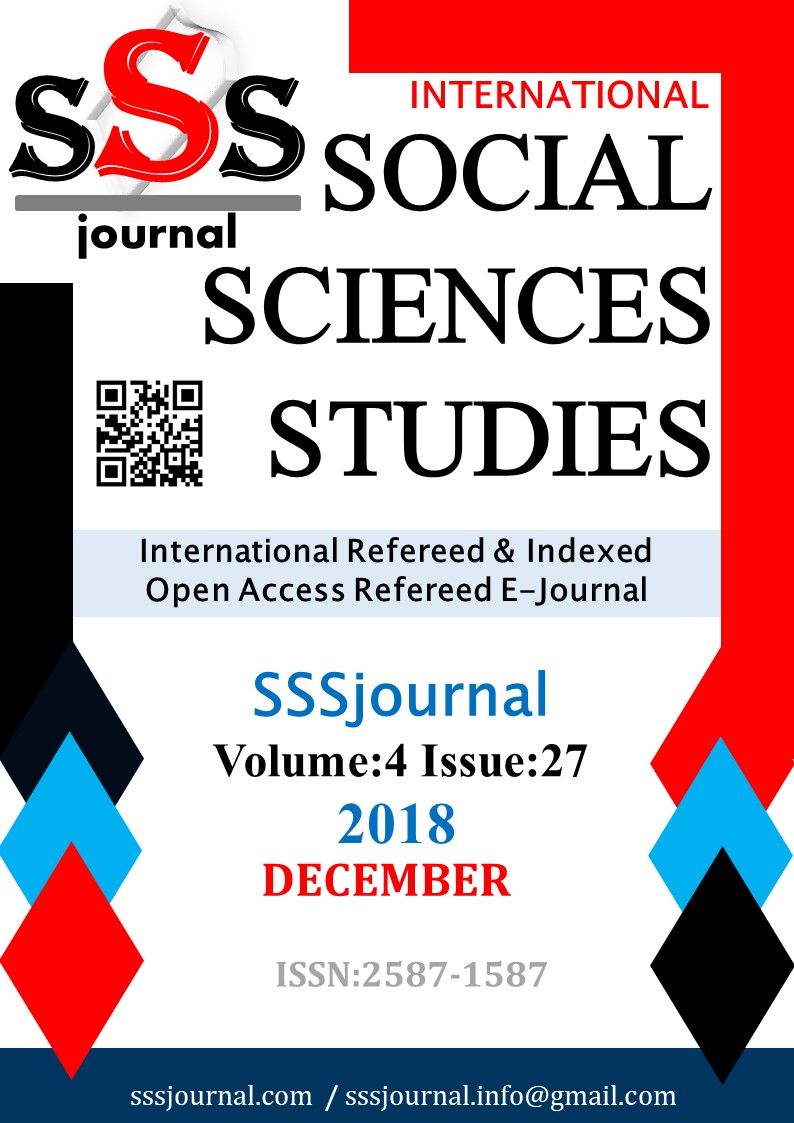Author :
Abstract
Dünyanın en önemli devrimlerinden biri olan Ekim devrimi feodal düzene, üretimsizliğe ve tembelliğe karşı bir başkaldırıdır. Ekim devrimine kadarki Rusya’da kısmen feodal ve kapitalist bir düzen görülür. Atalarının bıraktıkları mülk ile rahatça yaşayan derebeyleri mutluluğun işsizlikte olduğunu düşünmüşlerdir. Bu feodal düzenin tipik karakteri de Oblomov’dur. Rus derebeylik sınıfını temsil eden Oblomov olağanüstü uyuşuk bir karakterdir. Rusya’da toprak köleliğinin son bulmaya yüz tuttuğu bir dönemde bu yeni yaşama uyum sağlayamayan derebeylerin iki yaşam arasındaki sıkışmışlığının tanımıdır Oblomovluk. Bu çalışmanın amacı, Ekim Devriminin özelde Rusya topraklarından, genelde ise dünya üzerinden silmeyi amaçladığı insan tipinin en çarpıcı örneği sayılabilecek Oblomov’un, aslında yok edildiği sanıldıkça karşımıza yeniden çıkan insani bir durumun temsilcisi olduğunu ve en büyük devrimlerin bile onu tamamen silmeyi başaramadığı ibretlik bir karakter olduğunu gösterebilmektir. Oblomov, kendi döneminde tembellik ve çalışkanlık, üretim ile üretimsizliğin merkez karakterlerinden biri olurken, sonraki dönemde gerçekleşen Ekim Devriminin de referans karakterlerinden biridir.
Keywords
Abstract
One of the most important revolutions of the world, the October revolution, is a rebellion against the feudal order, the productionlessness and the laziness. Until the October revolution, there is partly a feudal and capitalist order in Russia. The feudal lords who lived comfortably with the properties left by their ancestors thought that happiness was in unemployment. The typical character of this feudal order is Oblomov. Oblomov, who represents the class of Russian overlords, is an extraordinarily lethal character. Oblomovluk is the definition of the jail between the two living creatures who cannot adapt to this new life at a time when slavery in Russia is about to end. The aim of this work is to show that Oblomov, the most striking example of the human type that the October Revolution intends to eradicate in particular from Russia's territory and in general from the rest of the world, is a representative character of a humanitarian situation in which the anticipation of a resurgent humanitarian situation is supposed to be destroyed and that even the greatest revolutions to show that it is. Oblomov is one of the reference characters of the October Revolution that took place in the next period, while laziness and hard work in his period are one of the central characters of production and productionlessness.
Keywords
- Adadağ, Ö. (2007). Fransız Devriminin Evrenselliği Üzerine, Muhafazakar Düşünce, 3/11, 55-70.
- Adadağ, Ö. (2007). Fransız Devriminin Evrenselliği Üzerine, Muhafazakar Düşünce, 3/11, 55-70.
- Arslan, Fatih (2012). Boş Zaman Figürleri ‘Erken Dönem Türk Romanında Nesne-Tüketim İlişkileri, Sinemis Yayın Grup, Ankara.
- Bank, B. (2011). Rusya’da 1905-1920 Yılları Arasında Tarihsel Dönüşüm ve Siyasal Tartışmalar. YDÜ Sosyal Bilimler Dergisi, IV(1), 2–37.
- Carr, E. H. (2015). Lenin’den Stalin’e Rus Devrimi 1917-1929. Çev. Levent Cinemre, (2. Baskı), Yordam Kitap, İstanbul.
- Devrisheva, L. (2014). Rusya’dan Türkiye’ye Göç Eden Aydınlar Gözüyle Bolşevik İhtilali. Mediterranean Journal of Humanities, 4/2, 61-70.
- Dobrolyubov, N.,A. (2010). Oblomovluk Nedir? (Çeviren: Mazlum Beyhan), Evrensel Basım Yayın, İstanbul.
- Eyüboğlu Sabahattin, Güney, Erol (2014). Önsöz-Oblomov, Türkiye İş Bankası Kültür Yayınları, İstanbul.Fitzpatrick, S. (2001). The Russian Revolution, (Second Edition), Oxford University Press, New York.
- Gonçarov, İvan Aleksandroviç (2014). Oblomov (Çevirenler: Sabahattin Eyüboğlu – Erol Güney), Türkiye İş Bankası Kültür Yayınları, İstanbul.
- Koç, Y. (2007). Rus Devrimi ve Vatan Savunması, Teori dergisi, ss. 15-21.
- Lenin, V. I. (1992). Nisan Tezleri ve Ekim Devrimi, Çev. Muzaffer Ardos, Sol Yayınları, Ankara. Levine, A. (2014). Russian Jews and the 1917 Revolution. Primary Source, 4,2.
- Luxemburg, R. (2009). Rus Devrimi, çev. Cangül Örnek, (1. Baskı), Yazılama Yayınevi, İstanbul.
- Sadikov, R. (2010). Şubat Devriminden Sonra Rusya’da İktidar Mücadelesi: Ekim Devrimi’ne Giden Yol. Ankara Üniversitesi Tarih Araştırmaları Dergisi, 29, 48.
- Somer, S. (1970). 100 Soruda Ekim İhtilali, Gerçek Yayınevi, İstanbul.
- Zajda, J. (2014). The Russian Revlution. In G. Ritzer & J.M. Ryan (Eds.), The WileyBlackwell Encyclopedia of Globalization Online.





